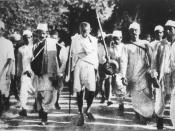The conception of humanity has and probably will never be accurately conceived, but few philosophers come quite close to swaying the crowd. Thomas Hobbes leads to say that human beings are ultimately selfish and always in a state of conflict. While it may sound a bit preposterous, it is quite logical and relevant, especially in today's society. Is every good or concerned act, thought or feeling only in that person's self -interest? Are there exceptions to this, or is it all of mankind?
So then, can be accurately say that every single action, thought or feeling, whether conscious or unconscious was pure selfishness and in our own self-interest? If it was not so, it would not even be conceivable. Man is by nature selfish and seeks of his own self-interest in every possible way. Man is born to be defensive; to protect one's self. Thomas Hobbes gives two (2) reasons why man is selfish.
The first is the desire for power and the second is the fear of others. There is also agreement to these reasons as they are relevant and effective to being selfish. Everyone wants to have power, to rule, to be the leader. One cannot accomplish these things is they do not seek success in their own self-interest. As any successful person would know man must be aggressive when pursuing any goal in life. So, then we are once again being selfish, not caring or considering what the other person wants or even needs. All we know is that we want power and some people achieve this by any means necessary. The other reason speaks of fear of others. It means that if you are not aggressive and confident in one's self it is because of fear. Man fears others so therefore; they will be mean, selfish.



Was a good one
It was quite informative and relevant. It makes a lot of sense and was fairly good.
2 out of 2 people found this comment useful.